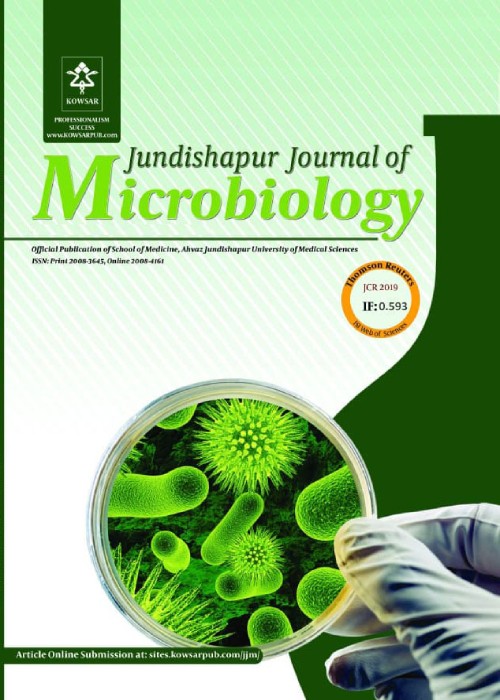Anti-Listerial Activity of Four Seaweed Essential Oils Against Listeria monocytogenes
Author(s):
Abstract:
Background
Listeria monocytogenes is one of the most virulent types of bacteria and causes severe foodborne illness, such as listeriosis. Because this pathogen has become resistant to sanitizers and other disinfectants that are used to clean utensils and surfaces during food processing, it poses a serious threat to the food industry.Objectives
The study was conducted to determine the anti-listerial potential of essential oils extracted from four edible seaweeds against L. monocytogenes.Materials And Methods
Essential oil was extracted from four edible seaweeds (Enteromorpha linza, Undaria pinnatifida, Laminaria japonica, and Porphyra tenera) against L. monocytogenes using the microwave hydrodistillation method. The anti-listerial activity of the essential oil was determined using the standard disc diffusion method.Results
Among the four essential oils, E. linza (ELEO) was most effective against all three strains of L. monocytogenes (11.3 - 16.0 mm). The other three essential oils were only effective against two strains, L. monocytogenes ATCC 19115 (10.0 - 10.5 mm) and L. monocytogenes ATCC 7644 (11.0 - 15.0 mm). The minimum inhibitory concentration and the minimum bactericidal concentration of all four essential oils varied from 12.5 - 25.0 mg/mL. Further, the mode of action of ELEO against L. monocytogenes was investigated by examining its effect on cell viability, the release of 260-nm absorbing materials, the number of K ions, the relative electrical conductivity, and the salt tolerance capacity. The results indicated that the essential oils exhibited strong anti-listerial activity against multiple strains of L. monocytogenes. It displayed potential inhibitory effects on the viability of bacterial cells and loss of integrity as indicated by an increase in the relative electrical conductivity, leakage of K ions and other 260-nm absorbing materials, and a loss of the salt tolerance capacity.Conclusions
The results presented herein provided insight into a possible explanation for the modes of action of essential oils on L. monocytogenes. The outcome of the present study may aid the food industry in locating the most promising potential anti-listerial agents from edible seaweed sources to control L. monocytogenes and also in facilitating their application in food processing and preservation techniques in a nontoxic and environmental friendly manner.Keywords:
Language:
English
Published:
Jundishapur Journal of Microbiology, Volume:9 Issue: 7, Jul 2016
Page:
6
magiran.com/p1572061
دانلود و مطالعه متن این مقاله با یکی از روشهای زیر امکان پذیر است:
اشتراک شخصی
با عضویت و پرداخت آنلاین حق اشتراک یکساله به مبلغ 1,390,000ريال میتوانید 70 عنوان مطلب دانلود کنید!
اشتراک سازمانی
به کتابخانه دانشگاه یا محل کار خود پیشنهاد کنید تا اشتراک سازمانی این پایگاه را برای دسترسی نامحدود همه کاربران به متن مطالب تهیه نمایند!
توجه!
- حق عضویت دریافتی صرف حمایت از نشریات عضو و نگهداری، تکمیل و توسعه مگیران میشود.
- پرداخت حق اشتراک و دانلود مقالات اجازه بازنشر آن در سایر رسانههای چاپی و دیجیتال را به کاربر نمیدهد.
In order to view content subscription is required
Personal subscription
Subscribe magiran.com for 70 € euros via PayPal and download 70 articles during a year.
Organization subscription
Please contact us to subscribe your university or library for unlimited access!


